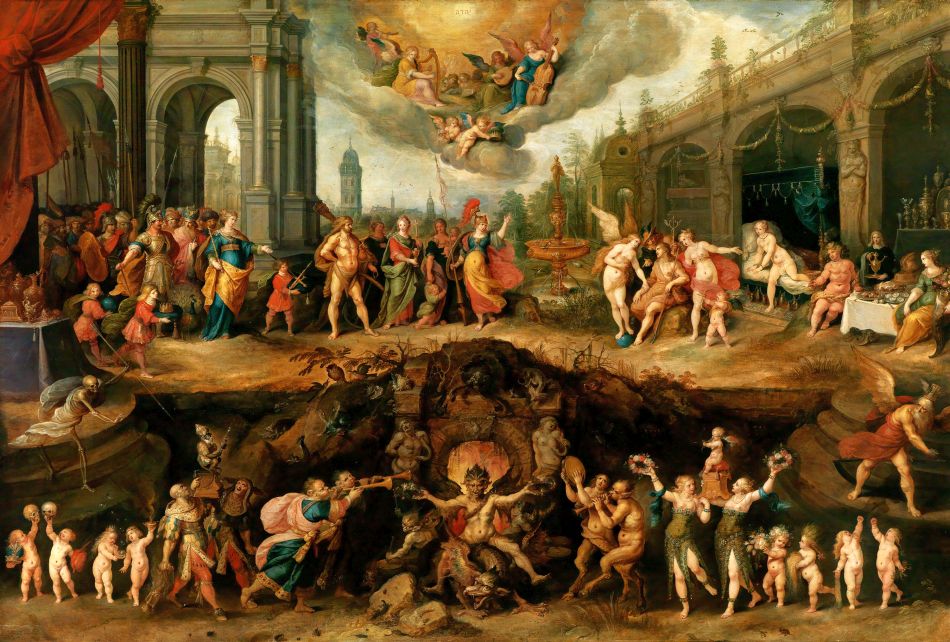DAWN
Daily Arts Web Nucleus
Discover the Arts! Each day a different image from the Literary, Performing, or Visual Arts representing a portion of Scripture plus an explanation with links 2015 April 24
Mankind's Eternal Dilemma - The Choice Between Virtue and Vice (1633)
Frans Francken the Younger (1581-1642)
Baroque Style
Museum of Fine Arts, Boston, Massachusetts, USA
Image Source: Wikipedia
Explanation: In Psalm 82 points us to God who stands as judge; and he demands that those who live sinfully before him repent and live justly. Today's painting depicts this dilemma between sin and obedience which mankind faces, as described in today's Psalm.
[ THEMATICALLY AND CHRONOLOGICALLY RELATED SCRIPTURES: WISDOM PSALMS. John 10:22-42. Psalm 1. Psalm 10. Psalm 12. Psalm 15. Psalm 19. Psalm 32. Psalm 34. Psalm 36. Psalm 37. Psalm 49. Psalm 50. Psalm 52. Psalm 53. Psalm 73. Psalm 78. Psalm 82. Psalm 91. Psalm 92. Psalm 94. Psalm 111. Psalm 112. Psalm 119. Psalm 127. Psalm 128. Psalm 133. Psalm 139. ]
[ CHRONOLOGY: GENERAL. Patriarchs (Traditional). Judges # 1. Judges # 2. Kings # 1. Kings # 2. Prophets # 1. Prophets # 2. NT # 1. NT # 2. NT # 3. ]
[ MAPS: Maps # 1. Maps # 2. Maps # 3. Maps # 4. Maps # 5. ]
[ COMMENTARIES, ETC: GENERAL: Bible Study Tools; Bible Hub: Study Light; Blue Letter Bible // PSALMS: Monergism: Precept Austin: The Treasury of David; John Gill; John Calvin - Volumes 1, 2, 3, 4, 5]
[ MUSIC: GENERAL: The Cyber Hymnal // PSALMS: Genevan Psalter (Instrumental). VARIOUS ARTISTS: Psalm 82 - #1. Psalm 82 - #2. Psalm 82 - #3. Psalm 82 - #4. ]
In the first verse of Psalm 82, Asaph directs our attention to God who is standing in the congregation of the mighty where he judges among the gods -- men who are rulers, as shown by the context (1). This first verse contains a three-part play on the Hebrew root word "mighty" (el). This is done in a way which indicates degrees of might. The first use of this root word is in the first word of the Psalm -- "God" (Elohim). The second use is in the word "mighty" (el). And the third use is in the word "gods" (elohim -- the same word used for the true God at the beginning of the verse). The three uses can be translated as "Almighty," "mighty," and "mightiest." In Hebrew, the plural ending can be used to indicate more than one; or it can be used as a superlative, as is the case in this Psalm, where it indicates "mightiest" when it applies to men, and Almighty when it applies to God. Scripture uses the word "elohim" to indicate men or angels in certain contexts; and in this Psalm it indicates men, as shown by the seventh verse. God asks these mighty rulers how long they will judge unjustly and play favorites with the wicked (2). He demands that these rulers defend and deliver the poor and afflicted. But, says God, they do not know what he is saying to them; they do not understand it; they walk on in darkness; and they overturn the foundations of the earth. He called them "gods" (supremely mighty ones) and children of the most High, but they will die like men and fall like the princes (3-7). Asaph closes the Psalm by calling on God to judge the earth; because he will inherit the nations. This is a clear reference to the end times when the Messiah (John 10:22-42) will conquer the earth (8).
THE PSALTER:
BOOK THREE OF FIVE:
Psalms 73-89.
Psalm 82
God standeth in the congregation of the mighty; he judgeth among the gods.
2 How long will ye judge unjustly, and accept the persons of the wicked? Selah.
3 Defend the poor and fatherless: do justice to the afflicted and needy.
4 Deliver the poor and needy: rid them out of the hand of the wicked.
5 They know not,
neither will they understand;
they walk on in darkness:
all the foundations of the earth are out of course.
6 I have said, Ye are gods; and all of you are children of the most High.
7 But ye shall die like men, and fall like one of the princes.
8 Arise, O God, judge the earth: for thou shalt inherit all nations.
* NOTE: On Opening and Closing Comments in the Psalms.
[Some commentators take the Psalm in Habakkuk 3 to be a standard model for the Psalms.
Habakkuk's Psalm begins with the name of the composer ( Habakkuk) and a musical notation (" upon Shigionoth").
It closes with a dedication or a " send to" notice (" To the chief singer on my stringed instruments").
I have arranged similar material, where it is found in the Psalter, in accord with the model in Habakkuk.]
ADDITIONAL AD LIB MATERIAL: Prose, Poetry, Writers, Visual Artists, Music, DAWN, and ILLUMINATION. ILLUMINATION features a compact, Illuminated Bible. DAWN, the page you are presently visiting, features a new image and explanation daily.
Please Email Comments and Questions To
AD LIB ARTS EMAIL
copyright 2014, Scott Souza
|
